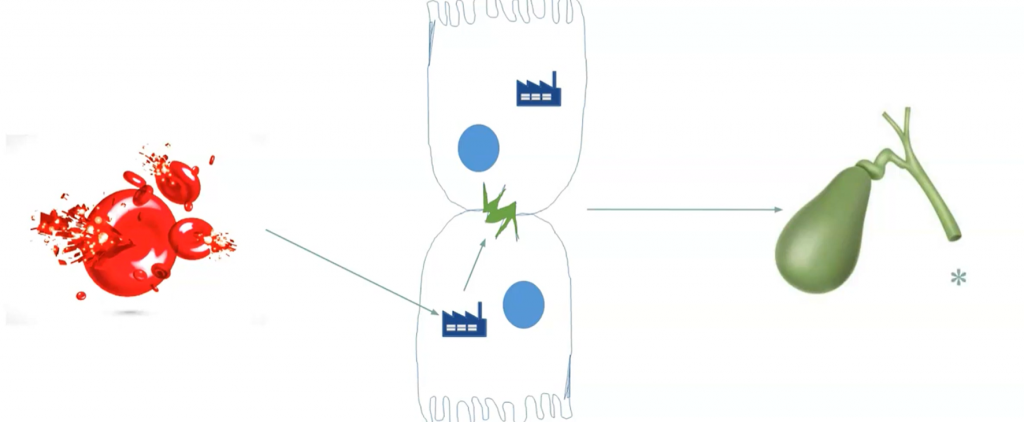4 Bilirubin
Bilirubinemia means high levels of bilirubin in the blood and this gives the appearance of jaundice. Jaundice appears when bilirubin levels are elevated. Jaundice is most readily observed in the sclera and mucous membranes.
Bilirubin is produced with red blood cell breakdown. Normally, bilirubin is bound to albumin and carried to the liver where it is conjugated and excreted in the bile.
From this video
Bilirubin metabolism requires both functional hepatocytes and functional biliary system.

Bilirubin levels can be elevated if
- too much unconjugated bilirubin hits the hepatocytes
- the liver is damaged and leaks bilirubin back into the blood because it can’t metabolize it well
- biliary obstruction creates back flow into the circulation
Bilirubinemia can be sorted into three forms related to those three causes:
- Pre-hepatic bilirubinemia
- This is generally due to a relative excess of bilirubin delivered to the liver.
- Hemolysis is a common cause.
- In this version, more (unconjugated) bilirubin reaches the liver than can be conjugated.
- This leads to excess unconjugated bilirubin in the blood
- The liver is fine, the biliary system is fine; the system is overloaded
- Hepatic bilirubinemia
- This can be due to congenital or acquired hepatic issues.
- The hepatocytes cannot manage to transform the unconjugated to conjugated bilirubin in sufficient amounts.
- Most of these disorders will result in high levels of unconjugated bilirubin but may also leak conjugated bilirubin due to related liver damage
- Post-hepatic bilirubinemia
- Bilirubin is conjugated by normal liver machinery; however, it can’t be excreted because of an obstruction in the biliary system
- Back pressure in the biliary system can lead to leakage of conjugated bilirubin
- Cholestasis from flukes, stones, tumors can cause this
- Surgery is potentially indicated for post-hepatic bilirubinemia.
Horses are different
Horses get jaundiced just from being off feed! This form is related to the diet components but is NOT associated with bilirubinemia. Horses do get elevated bilirubin when off feed and without liver damage; this is unconjugated bilirubin. The theory is they don’t have enough glucose to do the conjugation. Conjugated bilirubin should be normal unless there are other issues.
Resources
Veterinary Hematology and Clinical Chemistry – very useful ebook
Jaundice – osmosis video
Jaundice explained – 5 min video
Biliary excretion of waste products– CSU vivo site

